At the April 2021 board meeting, the IACBE Board of Commissioners voted to revise the 37 sub-principles that comprise the IACBE accreditation principles by consolidating the requirements contained in the sub-principles to be reflected in the existing nine principles. If the revisions to the principles are approved, the Board of Commissioners will work to revise the self-study manual to reflect the changes in its continuing efforts to ensure rigor in our principles and simplicity in our processes.
To this end, and pursuant to the IACBE Board of Commissioners Policies and Procedures Manual (July 2020), a 60-calendar-day period of public comment on proposed revisions to the IACBE’s accreditation principles must precede any vote on the amended principles. The notice of public comment on proposed revisions to the IACBE’s accreditation principles must be sent to the primary representatives of all academic business unit members of the IACBE and must also be posted on the IACBE’s website. The following notification of the proposed revisions is provided. The current principles with sub-principles are provided below the proposed revisions.
Comments are open through June 20, 2021 and should be made to iacbe@iacbe.org
Proposed Revised Principles:
Principle 1: Commitment to Integrity, Responsibility, and Ethical Behavior
Excellence in business education is demonstrated when the academic business unit acts ethically, responsibly, and with integrity in all interactions with its stakeholders, and has established systems for encouraging and upholding ethical and responsible behavior.
Principle 2: Quality Assessment and Advancement
Excellence in business education is demonstrated when the academic business unit is engaged in a process of continuous improvement in its programs and operations. This process includes ongoing assessment planning, collection and analysis of assessment data, and development and execution of action plans for improvements.
Principle 3: Strategic Planning
Excellence in business education is demonstrated by an informed, effective strategic planning process that focuses the academic business unit’s decision making toward defined goals, is linked to the unit’s outcomes assessment process, provides an overall strategic direction for guiding the unit into the future.
Principle 4: Business Curricula and Learning Opportunities
Excellence in business education is demonstrated by business programs that prepare students to be competent business professionals. This includes processes for program development and design, curricular content and learning opportunities, as well as regular curriculum review, renewal, and improvement.
Principle 5: Business Faculty Characteristics, Activities, and Processes
Excellence in business education is demonstrated by highly-qualified faculty who are current in their professions and engage in appropriate scholarly and professional activities. This includes processes and procedures to manage, develop, and evaluate faculty and to create a climate that promotes excellence in teaching and learning.
Principle 6: Policies, Procedures, and Processes
Excellence in business education is demonstrated by clear, transparent, and effective policies, procedures, and processes related to admissions, academic performance, and career development that are implemented in a fair and consistent manner and are aligned with the business unit’s mission.
Principle 7: Resources Supporting Business Programs
Excellence in business education is demonstrated by resources that are sufficient to support a high-quality learning environment, and to support the academic business unit in accomplishing its mission and broad-based goals.
Principle 8: External Relationships
Excellence in business education is demonstrated when the academic business unit maintains linkages with external stakeholders that are consistent with the unit’s mission and broad-based goals and is accountable to the public regarding its expectations for program quality and student success.
Principle 9: Innovation in Business Education
Excellence in business education requires the academic business unit to adapt to changes in the business profession and society. Therefore, the academic business unit must provide an environment that encourages and recognizes innovation and creativity in the education of business students.
Current Principles and Sub-Principles (complete text of each sub-principle is available on our website or by request):
1.1: Commitment to Integrity, Responsibility, and Ethical Behavior
1.2: Summary Reflection on the Commitment to Integrity, Responsibility, and Ethical Behavior
2.1: Assessment Planning
2.2: Assessment of Student Learning and Operational Effectiveness
2.3: Continuous Quality Improvement
2.4: Summary Reflection on Quality Assessment and Advancement
3.1 Strategic Planning
3.2 Summary Reflection on Strategic Planning
4.1 Business Program Development and Design
4.2 Curricula of Undergraduate-Level Business Programs
4.3 Curricula of Master’s-Level Business Programs
4.4 Curricula of Doctoral-Level Business Programs
4.5 International Dimensions of Business
4.6 Information Technology Skills
4.7 Curriculum Review, Renewal, and Improvement
4.8: Summary Reflection on Business Curricula and Learning Opportunities
5.1: Qualifications of Business Faculty
5.2: Deployment of Business Faculty
5.3: Scholarly and Professional Activities of Business Faculty
5.4: Professional Development of Business Faculty
5.5: Evaluation of Business Faculty
5.6: Summary Reflection on Business Faculty Characteristics, Activities, and Processes
6.1: Admissions Policies and Procedures
6.2: Academic Policies and Procedures
6.3: Career Development and Planning Services
6.4: Summary Reflection on Student Policies, Procedures, and Processes
7.1: Financial Resources Supporting Business Programs
7.2: Facilities Supporting Business Programs
7.3: Learning Resources Supporting Business Programs
7.4: Technological Resources Supporting Business Programs
7.5: Other Instructional Locations
7.6: Summary Reflection on Resources Supporting Business Programs
8.1: External Linkages with the Business Community
8.2: External Accountability
8.3: Summary Reflection on External Relationships
9.1: Innovation in Business Education
9.2: Summary Reflection on Innovation in Business Education

